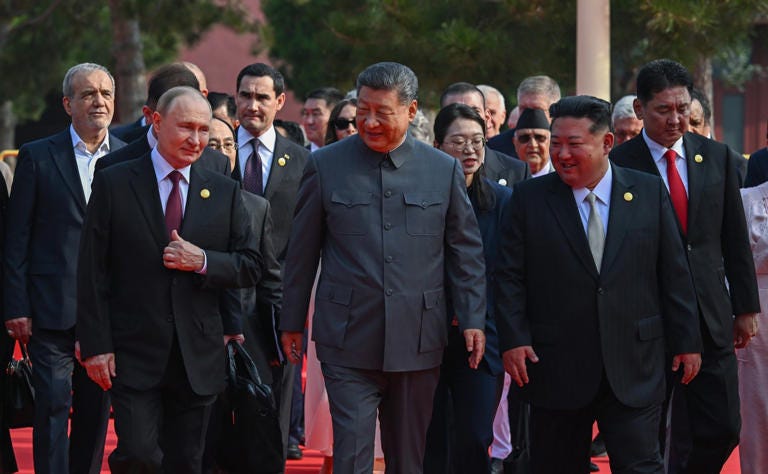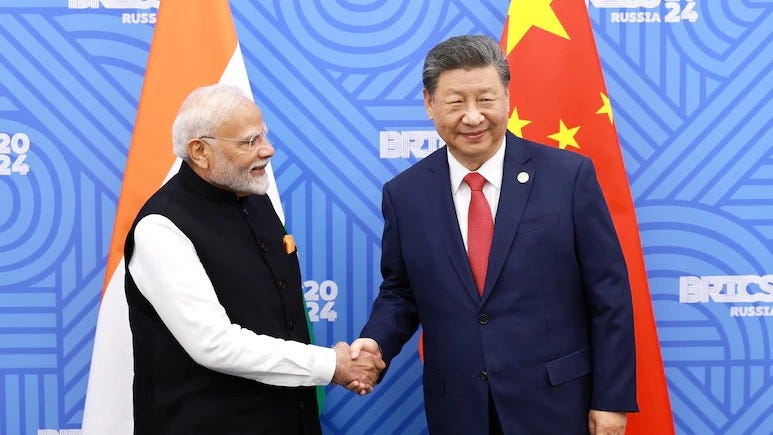The SCO Summit That Exposed America's Waning Power
Donald Trump’s capricious diplomacy erodes Washington’s global role
By: Salman Rafi Sheikh
The Shanghai Cooperation Organization (SCO) summit in China ended with a grand victory parade, but the real significance of the spectacle lay far beyond the military hardware on display. With Russia, India, Pakistan, Iran, and several other geopolitical heavyweights standing with Chinese leader Xi Jinping during and after the summit, Beijing used the event to recast itself from regional leader to gravitational center of what, for better or worse, resembles a new world order.
The parade was less about commemorating China’s role in World War II and more about signaling, in powerful symbolic terms, its readiness for the geopolitical battles it believes lie ahead. By fusing history with power projection, China sent a pointed message: it is not only capable of standing up to Washington’s strategies in Asia but is prepared to shape the global future on its own terms.
However, much of what unfolded in Tianjin can be traced directly to Washington’s own missteps. Under the Trump administration, US foreign policy appears impulsive and reactive, lacking a coherent long-term strategy either to sustain American dominance or to safeguard US interests through a careful balancing of bilateral and multilateral relationships. As reported in the world’s press, a striking example is Washington’s trade war with India. When the Trump administration imposed tariffs of up to 50 percent on Indian goods, it turned out to be nothing short of a strategic setback for India. The move also pushed New Delhi to quickly reassess its position and recalibrate its ties with Beijing. This shift was symbolized by Prime Minister Modi’s visit to China—his first since 2019—to attend the SCO summit.
Modi’s engagement in China carried further significance. Not only did he meet President Xi, but he also held talks with Russia’s President Vladimir Putin. This interaction amounted to a pointed rebuke of Washington. At a time when the US is pressuring New Delhi to curtail its purchases of Russian oil under threat of sanctions, Modi’s meeting with Putin signaled defiance of US demands and underscored the trajectory India was pursuing, distancing itself from US-led regional initiatives such as the Quad, and instead gravitating towards China-centric groupings like the SCO and BRICS.
In an image that appears to have been purposefully designed to convey a mood of solidarity, Putin and Modi were shown holding hands as they smiled, laughed, and walked towards Xi before the summit opened. “Conversations with him are always insightful,” Modi wrote on X. At the bilateral meeting, Putin addressed Modi in Russian as “Dear Mr Prime Minister, dear friend.”
Xi, then, himself delivered the perfect message that almost everyone in his audience from Russia to North Korea wanted to hear: “We must continue to take a clear stand against hegemonism and power politics, and practice true multilateralism,” adding that “Global governance (read: global world order) has reached a new crossroads.”
Thus, the Tianjin summit was not just about a victory parade or grandiose symbolism, it was about outlining the architecture of an alternative world order. One of its most telling but underreported outcomes was the proposal to create an SCO Development Bank. Several member states endorsed it immediately. On the surface, this might look like just another multilateral institution, but its intent is unmistakable. It is a deliberate attempt to chip away at the Western financial order that has, for decades, revolved around US-dominated institutions such as the World Bank, IMF, and Asian Development Bank.
The significance becomes clearer when placed alongside the Asian Infrastructure Investment Bank (AIIB), which Beijing launched in 2014. The AIIB was already a challenge to the West’s financial monopoly, offering loans to developing countries without the political conditionalities typically attached by Washington and its allies, although it still allowed Beijing to create its own mini monopolies.
The SCO bank, even if smaller in scale, sends a bolder signal: China is no longer content to merely compete with the West’s financial institutions—it wants to replicate and ultimately replace them within an ecosystem where Beijing sets the rules. In doing so, Xi Jinping casts himself not just as China’s strongman but as the chief architect of a China-led financial and political order, positioning his leadership in stark contrast to Washington’s reactive, sanction-driven playbook.
But the economic dimension was only part of the story. Politically, the SCO went a step further by openly denouncing Washington’s “coercive measures.” That diplomatic euphemism was, of course, aimed at US sanctions, the very instruments Washington has relied on to discipline adversaries and even strong-arm allies. The collective pushback amounted to a rare show of multilateral solidarity against American power, something Washington has long feared but is increasingly powerless to prevent.
The most striking move, however, was the deafening silence on the Russia–Ukraine war in the summit’s joint statement. The omission was no accident. For Moscow, it was a diplomatic victory: proof that its narrative carries weight beyond the West and that it is far from isolated on the global stage. For Beijing, it was a calculated snub to Washington and Brussels, who have insisted on making Ukraine the litmus test of international legitimacy. By leaving the war unmentioned, the SCO essentially declared: Ukraine may be your obsession, but it is not ours.
This is what makes Tianjin so pivotal and which may have turned the tide of global politics. The summit was not merely an expression of solidarity among like-minded states. It was a coordinated attempt to redefine the grammar of global politics. For China and Russia, the refusal to frame Ukraine as the world’s defining conflict is an assertion of narrative power. For smaller SCO states, it provides cover to resist Western pressure without standing alone. And for India, whose prime minister sat comfortably alongside Xi and Putin, it offered a platform to hedge against US demands and keep its strategic options open.
By the time the summit ended, one reality was unavoidable: Washington no longer controls the script of global politics, or at least it is not its sole author. It can threaten sanctions, wag fingers about democracy, and demand unity on Ukraine, but its words increasingly ring hollow outside NATO capitals. Meanwhile, China is busy building the scaffolding of a post-American order—one bank, one bloc, one carefully staged summit at a time.
Dr. Salman Rafi Sheikh is a longtime commentator on diplomatic affairs for Asia Sentinel. He is an Assistant Professor of Politics at the Lahore University of Management Sciences (LUMS).



Stopped reading when I hit the part about "China's relatively modest ro
le in world War II."
Now, really....
China hosts a Summit of the Scumbags, and Asia Sentinel cheers from the sidelines.